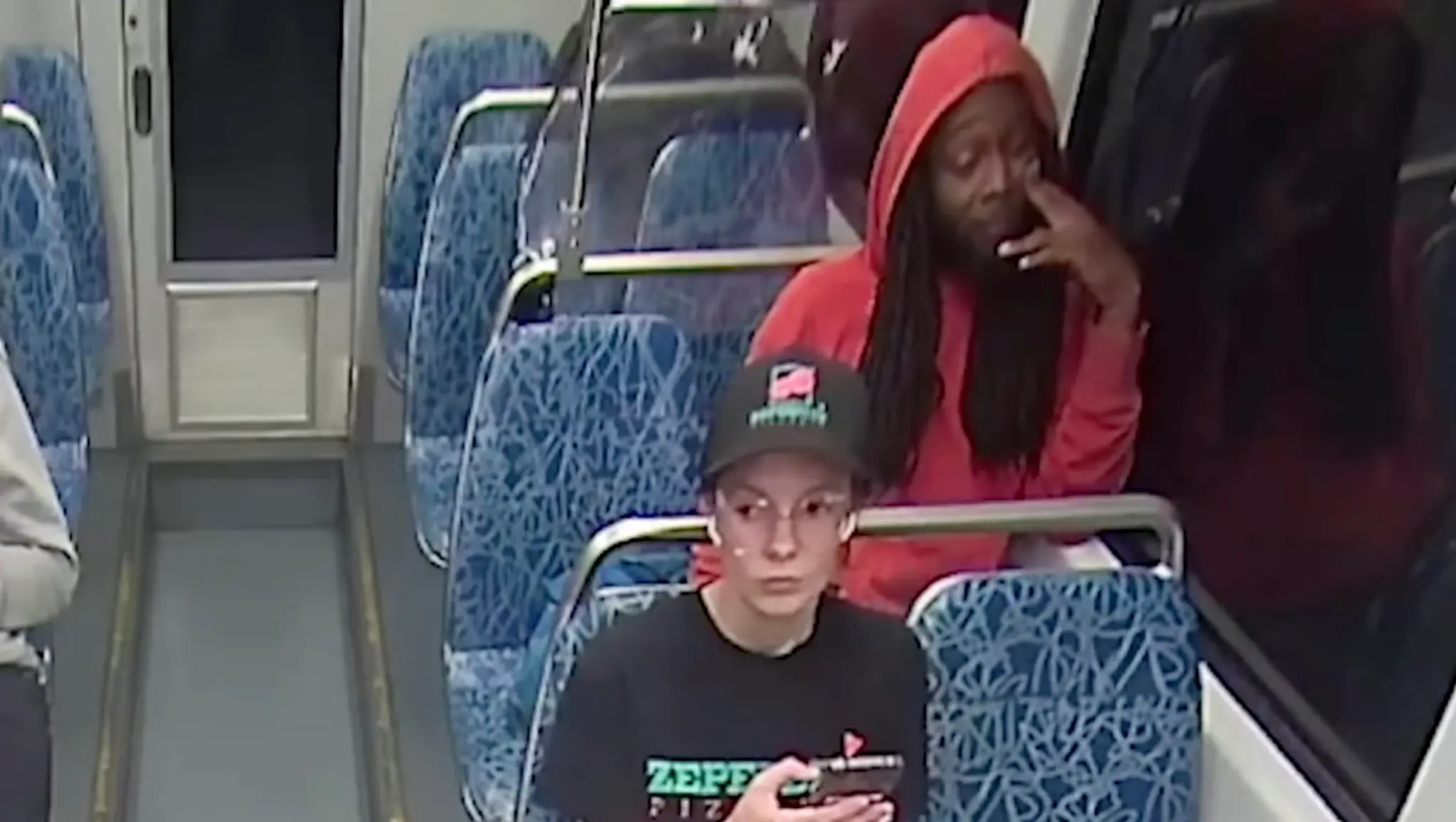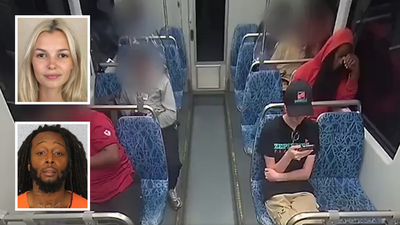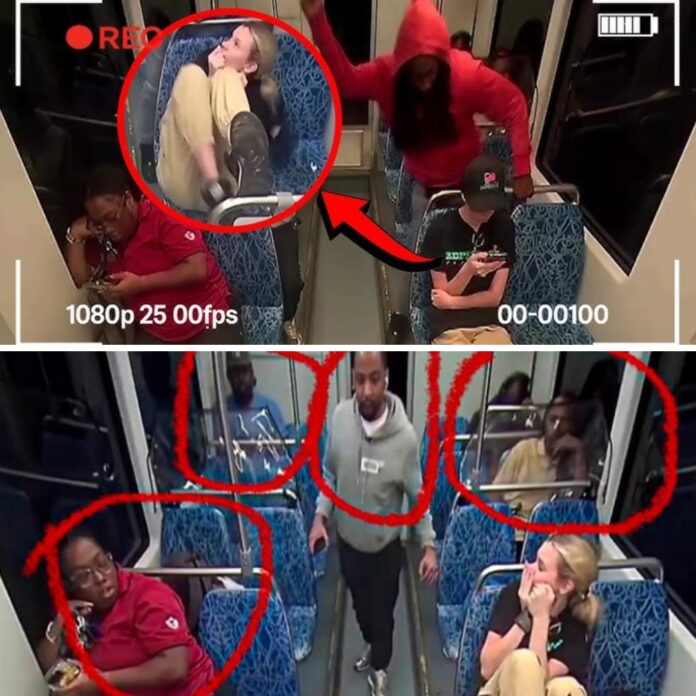In the flickering reflections of a Charlotte light rail window, a tiny keychain—gleaming like a talisman against the encroaching night—caught the eye of a late-boarding passenger just moments before tragedy struck. The woman, who slipped onto the Lynx Blue Line two stops after Iryna Zarutska, described the 23-year-old Ukrainian refugee clutching the small charm with white-knuckled desperation, as if it were her last tether to the world she had fought so hard to reach. Hours later, as investigators combed the bloodied scene at seat 14B, the keychain was nowhere to be found. Yet, enhanced CCTV footage from the carriage's opposite end revealed a haunting anomaly: a clear reflection of the very item, dangling briefly in the glass before vanishing into shadow. Was it a ghostly remnant, a thief's opportunistic grab, or evidence of a darker presence on that fateful train? This latest revelation in the murder of Iryna Zarutska has reignited demands for answers, turning her death into an ever-deepening mosaic of mysteries.
Iryna Zarutska's odyssey from Kyiv's war-ravaged streets to Charlotte's bustling pizzerias was a testament to unyielding spirit. Fleeing Russia's 2022 invasion with her mother Halyna, sister Olena, and brother Dmytro, she left behind a father bound by Ukraine's martial law, unable to join them or bid her farewell at her U.S. funeral. In Huntersville, North Carolina, Zarutska pieced together a mosaic of resilience: odd jobs to learn English, driving lessons from a boyfriend, enrollment at Rowan-Cabarrus Community College for art restoration, and shifts at Zepeddie's Pizzeria, where her sketches of stray animals adorned the break room walls. “She was a whirlwind of color,” her coworker Sofia Martinez told WBTV, tears tracing the flour-dusted lines of her face. “That keychain? It was her lucky charm—a silver sunflower from Kyiv, etched with a tiny dove. She'd fiddle with it during rushes, whispering, ‘Fly me home safe.'” Zarutska, a gifted sculptor and designer of eclectic clothing, dreamed of veterinary work, her vibrant spirit a bridge between old wounds and new horizons.
On August 22, 2025, that spirit faced its cruelest test. Clocking out at 9:30 p.m., still in her black apron dusted with parmesan, Zarutska boarded the Blue Line at Scaleybark station, her backpack heavy with a sketchbook of feline portraits and crumpled tips. At 9:46 p.m., she entered the middle car, pausing for nine frozen seconds at seat 14B—a hesitation now etched in viral infamy, as if her instincts screamed of the shadow lurking behind. Witnesses later recalled her soft whisper—”I hope it’s quiet tonight”—captured in carriage audio that eerily synced with a 12-second CCTV blackout, fueling theories of tampering or unseen intervention. The train lurched forward, and two stops later, at Archdale, a woman named Elena Vasquez boarded, drawn by the sparse late-night crowd. Seated across the aisle, Vasquez's eyes landed on Zarutska, who sat rigidly, her right hand clenched around the sunflower keychain attached to her apartment keys. “She gripped it like a lifeline,” Vasquez recounted to CMPD detectives, her statement resurfacing in a leaked report obtained by AS USA. “Her knuckles were white; she kept glancing back, but smiled faintly when our eyes met. I thought she was just tired.”
Vasquez's account, corroborated by a second passenger, paints a portrait of mounting dread. Zarutska's phone, clutched in her left hand, had captured a 7:58 p.m. selfie earlier that evening—apron askew, grin defiant—sent to Martinez with the caption, “Pizza queen, ready for home!” By 9:50 p.m., home was a receding dream. Decarlos Brown Jr., 34, seated directly behind her in a red hoodie, erupted from his paranoia. Diagnosed with schizophrenia and fresh from jail on a theft charge—deemed “low risk” despite a litany of assaults and robberies—he drew a pocket knife and plunged it three times into Zarutska's throat. The attack, unprovoked and merciless, unfolded in seconds: Zarutska clutched her neck, blood arcing onto the seat, her body slumping as her phone skittered away. Brown paced, muttering delusions of “signals” from the “white girl,” before fleeing at East/West Boulevard, discarding the blade on the platform. Paramedics pronounced her dead at 10:15 p.m., her folded apron—its tip pocket inexplicably empty of cash and sketches—beside her like a discarded flag of surrender.

The keychain's absence emerged during the crime scene sweep, a detail that chilled forensic teams. Zarutska's backpack yielded keys sans charm; the sunflower, a handmade heirloom from her Kyiv days symbolizing Ukraine's resilience, was gone. “It wasn't just a trinket,” Olena Zarutska told CNN, her voice fracturing. “Mama gave it to her before we fled—'For light in the dark,' she said. Now it's vanished, like Iryna's light.” No trace on Brown at arrest: no keychain, no sketches, no tips. His sister, in a WCNC interview, claimed his untreated illness conjured “mind-readers” on the train, but offered no insight into the theft.
Then came the reflection. Analysts, re-examining footage from the carriage's rear camera—angled toward the front but capturing window distortions—spotted it: at 9:48 p.m., a glint of silver sunflower, mirrored in the glass at the far end, some 40 feet away. The image lingered for three frames, as if held aloft, before dissolving into the reported shadow—a tall, hunched silhouette witnesses like Jamal Washington described as “not matching anyone aboard.” “It's unmistakable,” Dr. Elena Vasquez (no relation to the witness), a UNC Charlotte forensic video expert, told Hindustan Times. “The etching, the dove—the keychain's profile is exact. But how? Light refraction doesn't fabricate details like that. Someone carried it back there, or… something else.” The anomaly aligns with the audio gap and shadow sightings, prompting X sleuths to dub it #ZarutskaKeychainGhost. Posts dissect the frames: @NCShadowHunter claims, “Reflection moves independently—before Brown even stirs. Accomplice?” with 50,000 views. CMPD, in a terse October 18 update, attributes it to “multi-angle glare from passing lights,” dismissing a second suspect amid FBI involvement. Yet, the empty apron pocket and missing sketchbook—a doodle-filled notebook of her vet tech aspirations—compound the riddle. “Deliberate,” a retired detective posted anonymously on X. “Folding the apron, pocketing the charm—ritual, not chaos.”
The keychain's echo reverberates beyond forensics, amplifying a chorus of grief and fury. Zarutska's GoFundMe, swelling past $150,000, evokes her as a volunteer at animal shelters, cooing over strays she sketched into whimsy. “She'd nurse birds with broken wings,” Halyna told The New York Post. “That dove on the keychain? It was her soul.” Ukrainian Ambassador Oksana Markarova decried the loss as “sanctuary shattered,” vigils blooming from Maidan Square to Charlotte's Tryon Street. Her death birthed “Iryna's Law,” signed October 19 by Governor Josh Stein, curbing cashless bail and mandating mental health probes for releases— a bittersweet legacy amid Brown's 2026 trial delay, sparking Breitbart headlines of “outrage.”

High-profile voices thunder on. Elon Musk's September 20 X poll—”Fire the judge who freed Brown?”—drew 85,000 yes votes. JD Vance, in Concord, blamed “soft policies,” floating National Guard deployment. Trump called her “slaughtered by a monster,” the White House video amassing millions. Charlotte Mayor Vi Lyles pleads for restraint, thanking outlets withholding footage, but #JusticeForIryna surges with 911 call releases—”People are freaking out,” one caller gasped—viewed over 20 million times. Racial undercurrents simmer: posts like @DennisM19799's decry “thug” narratives, while @ProfBlacktruth counters with probation disparities, the case a powder keg in crime debates.
Brown, federally charged with a mass transit death penalty count, rots in Mecklenburg jail, his lacerated hand a mocking parallel to Zarutska's severed dreams. NAMI pushes for evaluations, citing his history as a systemic siren. Seat 14B, cordoned like a crypt, whispers of reforms: enhanced CATS audio, panic buttons, patrols. Zarutska's family, citizenship pending, weighs repatriation—Ukraine's soil calls, but Charlotte's fight beckons.
The keychain's reflection endures, a silver sunflower blooming in fractured glass: symbol of light stolen, perhaps pocketed by shadow's hand. For Iryna, who clutched it against the dark, it was hope incarnate. Its vanishing reflection? A mirror to America's fractures—unseen threats, delayed justice, dreams dissolved in transit's indifferent rush. In clutching that charm, she reached for peace; in its echo, we glimpse the void she left, urging us to grasp tighter before the light fades.
